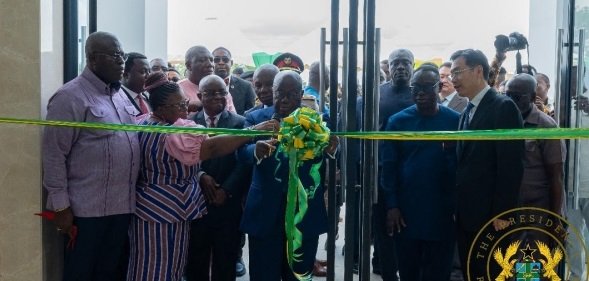News
President Akufo-Addo commissions phase II expansion project of UHAS

On Monday, July 29, 2024, President Nana Addo Dankwa Akufo-Addo commissioned the Phase II expansion project of the University of Health and Allied Sciences (UHAS), highlighting the significance of this development for Ghana’s healthcare sector.
Reflecting on the project’s journey, President Akufo-Addo recalled the sod-cutting ceremony for Phase II on September 10, 2021. He acknowledged the need for further infrastructural development at UHAS to fulfill its mandate effectively.
Under his directive, the Ministers for Education and Finance, in collaboration with UHAS management and the then Vice Chancellor Professor John Owusu Gyapong, secured $60 million in funding from the Chinese Government.
The President expressed gratitude to the President, Government, and People of the People’s Republic of China for their support and the strengthening bilateral relations between the two nations.
He also acknowledged the efforts of the outgoing Chinese Ambassador to Ghana, His Excellency Lu Kun, and his predecessor, the late Ambassador Her Excellency Sun Bahong.
The contribution of the contractors, Nantong Sijian Construction Group, and Ghana’s former Ambassador to China, Ambassador Edward Boateng, was also recognized.
The completion of Phase II will significantly enhance UHAS’s capacity to train more health professionals, including doctors, nurses, pharmacists, and other allied health practitioners.
This expansion is essential to address the growing healthcare needs of Ghana’s population and the demand for a skilled workforce. With additional facilities and resources, UHAS will be better positioned to offer comprehensive education and practical training, ensuring graduates are well-prepared for the healthcare sector’s challenges.
Moreover, the new facilities will support cutting-edge research and innovation, allowing scientists and researchers to explore new advancements in medicine and healthcare delivery.
This progress is crucial for developing locally relevant solutions to health challenges and establishing Ghana as a leader in health research in Africa.
To mark this special occasion, President Akufo-Addo announced a personal donation of ten desktop computers and ten laptops to UHAS. These devices will aid the administration and enhance the university’s capacity to provide quality education and services.
President Akufo-Addo also took the opportunity to express his profound gratitude to the outgoing Chairperson of the University Council, the esteemed former Justice of the Supreme Court, Mr. Justice Jones Victor Mawulorm Dotse, for his exemplary leadership and contributions over the past six years. He wished Mr. Dotse God’s blessings and success in his future endeavors.
The commissioning of the Phase II expansion project marks a significant milestone in UHAS’s journey towards becoming a premier institution for health education and research in Ghana and beyond.
News
National Service Authority gets new Director-General

The National Service Authority (NSA) has officially welcomed a new Director-General, Ms. Ruth Dela Seddoh, following a brief handing-over ceremony at its headquarters on Tuesday.
The event marked the formal transfer of leadership from the outgoing Director-General, Mr. Felix Gyamfi, to Ms. Seddoh. Management and staff of the Authority attended the ceremony.
Mr. Gyamfi used the occasion to thank staff for their support during his tenure.
He encouraged them to give the same cooperation to Ms. Seddoh to ensure the continued growth and impact of the Authority.
Ms. Seddoh expressed appreciation to government for the confidence placed in her.
She promised to build on the achievements of her predecessor and called for teamwork, dedication and innovation to help the NSA deliver on its mandate to support national development.
Management of the Authority pledged their full support to the new leadership as the organisation enters its next phase.
By: Jacob Aggrey
News
NSA board sets up committee to supervise digital reforms

The Governing Board of the National Service Authority (NSA) has announced the inauguration of a Transition and Implementation Steering Committee (TISC) to oversee the Authority’s digital transformation agenda.
According to the Board, the move follows a letter dated 17 June 2025 from the Office of the President to the Minister of Youth Development and Empowerment directing the suspension of the existing deployment system, calling for an audit of its operations and instructing the design and deployment of a new digital platform.
The Board explained that the audit had been completed and had found the existing system unsatisfactory.
It indicated that the Minister had written to the Board to begin the necessary legal processes to ensure the contract for the audited system, which expired in August 2025, would not be renewed, and to take further steps toward designing and deploying a new digital platform that would guarantee transparency, security and real-time verification of service personnel postings.
It stressed that the TISC had been established to ensure a smooth and orderly transition from the current National Service Scheme digital platform to a new ICT-led system aimed at improving efficiency, transparency and service delivery.
The Authority outlined the Committee’s mandate as overseeing the phased migration from the legacy system, directing the design and deployment of a modern digital platform, and supervising its operationalisation across core functions including personnel enrolment, postings, payroll, allowances and scheme administration.
It further noted that acting under the directives of the Minister of Youth Development and Empowerment and deriving authority from the NSA Board, the TISC has the power to issue instructions to NSA departments and engage external partners necessary to achieve its mandate through the Governing Board.
The Authority named Dr. Wisdom Atiwoto, a member of the NSA Board and Director of Research, Statistics and Information Management at the Ministry of Health, as chair of the Committee.
Other members include Ms. Ruth Dela Seddoh, Mr. Shadrack Mensah, Ms. Elorm Goh, Mr. Benjamin Freeman Kusi, Ms. Jennifer Opong, Dr. Stephan Nwolley, Mr. Koku Abotsi, Mr. Japhet Kuntu, Mr. Nabil Abubakar Hussayn and Ms. Regina Obenewa Penrose as Secretary.
The NSA Board assured the public and stakeholders of its commitment to innovation, accountability and excellence in service delivery.
It emphasised that there would be no disruption in the fulfilment of its obligations to national service personnel as outlined in the National Service Act, Act 1119 (2024), and indicated that updates on the Committee’s progress would be communicated in due course.
With the collective expertise of its members, the TISC is expected to deliver a robust and future-ready platform that will anchor the next phase of the National Service Scheme’s operations.
By: Jacob Aggrey














